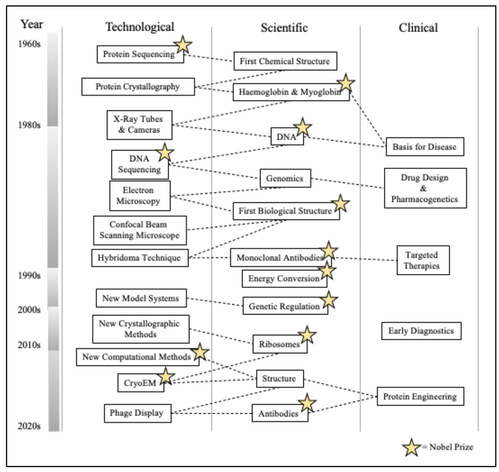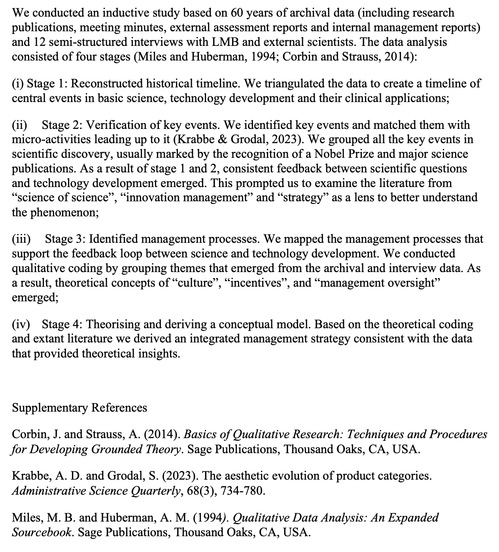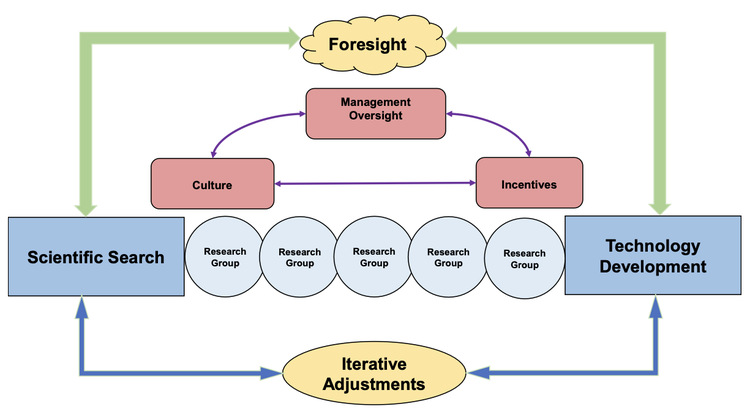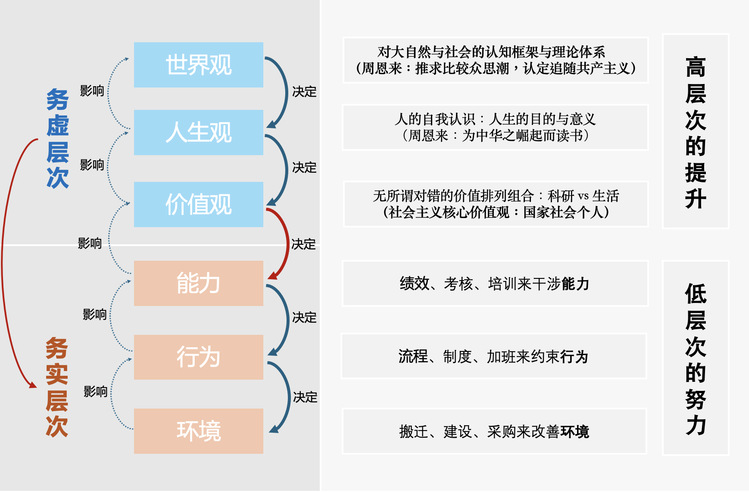Nature 630, 813-816 (2024)
doi: https://doi.org/10.1038/d41586-024-02085-2

The Medical Research Council’s Laboratory of Molecular Biology (LMB) in Cambridge, UK, is a world leader in basic biology research. The lab’s list of breakthroughs is enviable, from the structure of DNA and proteins to genetic sequencing. Since its origins in the late 1940s, the institute — currently with around 700 staff members — has produced a dozen Nobel prizewinners, including DNA decipherers James Watson, Francis Crick and Fred Sanger. Four LMB scientists received their awards in the past 15 years: Venkatraman Ramakrishnan for determining the structure of ribosomes, Michael Levitt for computer models of chemical reactions, Richard Henderson for cryo-electron microscopy (cryo-EM) and Gregory Winter for work on the evolution of antibodies (see following figure). Between 2015 and 2019, more than one-third (36%) of the LMB’s output was in the top 10% of the world’s most-cited papers1.

This figure highlights the dynamic feedback between technological development and scientific questions. It categorises technological, scientific and clinical developments that can be traced back to the LMB from the 1960s to the 2020s. Stars highlight developments that received a Nobel prize. Dotted lines show how technological tools informed scientific findings and vice versa and how these were translated into clinical applications.
What is the secret of the LMB’s success? Many researchers and historians have pointed to its origins in the Cavendish Laboratory, the physics department of the University of Cambridge, UK, where researchers brought techniques such as X-ray crystallography to bear in the messy world of biology. Its pool of exceptional talent, coupled with generous and stable funding from the Medical Research Council (MRC), undoubtedly played a part. However, there is much more to it. None of these discoveries was serendipitous: the lab is organized in a way that increases the likelihood of discoveries (see ‘New questions, new technologies’).
To find out how, we conducted 12 interviews with senior LMB and external scientists to provide insights into the organization. We also analysed 60 years’ worth of archival documents from the lab, including research publications, meeting minutes, external assessments and internal management reports (see SI for methods).

New questions, new technologies
The LMB’s approach is to identify new and important scientific questions in uncrowded fields that require pioneering technologies to answer them. The lab develops that technology to open up the field; continual improvements bring more breakthroughs, which can be scaled up to enter markets. Here are three examples.
DNA sequencing. In the 1940s and 1950s, biochemists Max Perutz and John Kendrew sought a way to discriminate between normal and pathological haemoglobins and myoglobin. The LMB developed molecular fingerprinting and chromatography technologies11 that allowed various biological questions to be addressed, such as how genes are regulated or how molecular programming is involved in cell death. Protein and DNA sequencing also enabled the study of molecular mechanisms of viruses and organ development. Transferring these discoveries into clinical and industrial settings changed drug discovery from a process of screening compounds to one of active design.
Antibodies. At the LMB in 1975, biologist George Köhler and biochemist César Milstein discovered a method to isolate and reproduce individual (monoclonal) antibodies from the many proteins that the immune system makes. This breakthrough enabled the characterization of antibodies, and sparked inquiries into gene regulation and programmed cell death. Monoclonal antibodies now account for one-third of new treatments that reach the clinic.
Cryogenic electron microscopy. The LMB has a long-standing history in the development of electron microscopy, with Aaron Klug’s group using it in the 1960s to elucidate the structure of viruses. Cryo-EM visualizes atoms in biological molecules in 3D. It was developed on the back of three decades of the LMB’s accumulated expertise in areas from optimizing cooling and vacuum technology to microscopy, computing-based imaging and electron detectors. The method has revolutionized protein research and many other areas.
We identify the LMB’s management model as the key — it sets a culture with incentives and provides oversight to optimize the interplay between science and technology. By integrating high-risk basic science with innovative technology, the LMB facilitates a knowledge feedback loop that helps the institute to identify promising questions and continuously push scientific boundaries (see SI, quote 1). In the context of economics and management theory, the LMB behaves as a ‘complex adaptive system’.
Quote 1: The role of engineering tools is pertinent:
“New methods have always been at the heart of the rapid progress in molecular biology. It is thus pertinent to emphasise that the Laboratory, since 1962, has been at the forefront of development of methods and apparatus for molecular biology. Past examples are the method of isomorphous replacement, which made the solution of protein structures possible; protein and DNA sequencing; the construction of new types of powerful X-ray tubes and cameras, which made it possible to work on large weakly diffracting systems like viruses; low dose, high high-resolution imaging and image reconstruction methods in electron microscopy, which opened the structure determination of macromolecular assemblies in three dimensions; monoclonal antibodies; time-resolved X-ray diffraction of dynamical systems; protein engineering, and so on. A recent example is the confocal scanning microscope, which is a powerful new tool in studying cellular structure, and which has been successfully commercialised” – LMB Quinquennial Review [1996].
Here, we outline our findings and encourage research organizations, funding bodies and policymakers to consider adopting a similarly holistic and coherent approach to managing basic scientific research. In short, they should prioritize long-term scientific goals and effectively manage scarce resources; foster economies of scale and scope by promoting complementarities between different areas of scientific research; and create value by establishing synergies and feedback between scientific questions and engineering-based technology solutions.
Integrated management
The LMB’s management strategy prioritizes three elements — culture, incentives and management oversight — that sustain a feedback loop between science and technology development (see below figure).

LMB’s integrated management strategy prioritises three elements: culture, incentives and managementoversight. LMB tackles basic scientific questions, necessitating the development of new technologies. While each group may request specific equipment, overlaps between the groups are prioritised by management for funding, which incentivises collaboration. The utilisation of shared equipment enables new insights, often resulting in the development of foresight through the identification of new scientific questions. This perpetuates a positive feedback loop, driving ongoing advancements and reinforcing LMB's position at the forefront of scientific research.
强调了务虚可能比务实更重要(附下图:最近总结的务虚 vs 务实)

Culture. The LMB sets a coherent culture by promoting scientific diversity among its staff, encouraging the exchange of knowledge and ideas and valuing scientific synergies between different areas of research. Senior managers view this culture as central to an evolutionary process in which a broad and diverse talent pool helps the organization to be flexible and to adapt and survive. Scientific discovery emerges from it in a sustainable but unpredictable way.
The LMB recognizes the importance of having a defined, yet broad and open, institutional research direction. It encourages the recruitment of groups with diverse but aligned interests that are complementary (see SI quote 2). This approach has ensured that the LMB can achieve a critical mass of expertise in specific research areas. It enables economies of scale while retaining the flexibility to innovate by pioneering new avenues and emerging fields. It also recognizes that not every promising direction can be followed.
Quote 2: The LMB encourages the recruitment of groups with complementary interests:
This cooperative atmosphere is encouraged by the recruitment of groups with overlapping interests, ensuring a critical mass in certain areas and providing a breadth of expertise that no one group could achieve. By this means, our strengths are maintained and developed over time – LMB Quinquennial Review [2010].
志同道合 但 研究背景迥异且互补的科学家
Scientific diversity has been a trait from the start. Although the lab was founded by physicists and chemists, its researchers today include mathematicians, engineers and zoologists (see SI quote 3). Yet too much variety is to be avoided in case it dilutes the culture. 科研方向的多样性很重要,但也也要有个限度,以免冲淡整体的科研文化。Minutes of an executive committee meeting from 1997 reveal the reticence of lab heads to appoint purely clinical researchers on the grounds that this might alter the lab’s culture and its focus (see SI quote 4).
Quote 3: The importance of the LMB's scientific diversity:
The LMB was founded by physicists and chemists: this physical view of biology persists, but the now much larger laboratory has a broad mix of talented individuals from very different backgrounds, including mathematics, engineering, and zoology. This means that it is usually possible to find someone in the laboratory to help you understand any problem that might arise in basic physics, chemistry, or biology – LMB Quinquennial Review [2001].
Quote 4: Recruitment can affect the strategy as a whole:
“The strategy was specifically to move towards understanding and curing disease, which required staff able to undertake clinical research, in this case putting vectors into patients to achieve long term expression...such an appointment could affect the culture of the Laboratory hence impacting on the strategic direction of the Divisions and LMB as a whole.” – LMB Executive Committee Minutes [1997]
A diverse portfolio of related and aligned themes makes it easier to share techniques and methods between projects and inspires programmes to aim at bolder goals (see SI quote 5). For example, the development of cryo-EM to examine macromolecules benefited both the structural-studies division and the neurobiology division, and led to a better understanding of molecular pathways in neurodegeneration.
Quote 5: An example of the lab pressing forward with new technology to work on problems at the edge of what is possible – but in complementary directions:
In Cell Biology the major aim at the last review had been to expand into mammalian biology and this remained the vision. But it was also important not to suggest that cell biology only took place in that Division, since this reduced the case for the institute as a whole, and there was real attraction in presenting cross-divisional strategies.{...} Creating a sense of cross-divisional strategies had the added benefit of enabling group leaders to see their work as part of a larger umbrella programme, which might inspire individual programmes to aim at bolder goals – LMB Executive Committee Minutes [2008]. 志同道合的基础之上 很容易就会建立学科交叉合作!
Incentives. The LMB uses an incentive structure to align the organization’s culture with the goals of its people. Actively promoting shared values and common aims helps researchers to feel part of the LMB community and proud to belong to it, fostering long-term loyalty. “The LMB has always had a non-hierarchical structure — one in which emphasis lies in the quality of the argument, rather than in the status of the proponent,” a 2001 external review of the LMB noted (see SI quote 6).
Quote 6: LMB uses an incentive structure to align the organisation’s culture with the goals of its people:
The LMB has always had a non-hierarchical structure – one in which emphasis lies in the quality of the argument, rather than in the status of the proponent. To foster such a freely intellectual forum, the Laboratory is (now) divided into four Divisions, each having its own scientific policy and subculture; within each Division, virtually all career scientists have their own, independent scientific programmes. It might be thought that this wide distribution of scientific control would lead to fragmentation, but the opposite tends to be true.” – LMB Quinquennial Review [2001]. 志同道合基础之上的自由探索 不仅不会导致研究的分散,相反会进一步强化研究整体。从另外一个角度讲:任何研究规划都当以促进研究交叉合作为目的,而不是为了方便管理!
Unlike many labs, the LMB focuses on investing in and promoting junior members rather than bringing in external talent. This is reflected in the high standards of its junior scientific recruitment. Many of its Nobel prizewinners, including Richard Henderson and Gregory Winter, began their careers at the lab and were promoted internally. 志同道合基础之上的严格引才标准很重要;引才之后的全力培养更重要,使每个青年科学家都可以成为整体规划中不可或缺的一份子,而不是强化与校外专家之间的合作。
Prioritizing small teams also optimizes the sharing of technologies and budgets and incentivizes scientists from different fields to converge on the same projects. Although the LMB is structured in divisions, almost all career scientists have independent but aligned scientific programmes. This connectivity often leads to rapid and creative combinations of ideas between teams. It also allows for the sharing of failure and resilience to it, which is inevitable in high-risk, high-stakes innovative research (see SI quote 7). 资助三个臭味相投的臭皮匠有时比资助可号令三军的诸葛亮性价比更高。
Quote 7: The importance of small groups sharing expertise:
It is an important feature of the Laboratory that the permanent staff represent a broad spectrum of expertise which ranges from biology through biochemistry, chemistry, and physics to mathematics. The research is carried out by many small groups, mostly of three to four people and none larger than about a dozen, each under the leadership of a tenured member of staff. The absence of a rigid organisational structure and the lack of a rigid hierarchy ensures that expertise is shared and encourages extensive collaborations between the divisions at all levels. There are also close collaborations with other academic laboratories in the UK and overseas and with industry. Resources for the support of the scientific programmes are organised so that maximum flexibility of deployment can be achieved and maintained throughout the financial year. {...} This in itself is a great encouragement to the staff since it is clear that the response to scientific need is paramount – LMB Quinquennial Review [1996].
LMB resources are allocated in ways that encourage innovative collaboration between internal teams and divisions. For example, limits are set for research groups to bid for external grants, because these tend to have short-term, results-oriented requirements that might not align with the LMB’s longer-term ambitions. 与校外专家之间的合作往往是短期及具体研究结果导向,与我们实验室的长期研究方向多半不同,所以会受到很多限制。
Furthermore, the LMB’s director can flexibly allocate funds to promote innovative collaborations and initiatives. Recent examples include forays into synthetic biology (using engineering to develop or redesign biological systems) and connectomics (the study of the connections in the brain and nervous system).
Management oversight. The LMB uses a management oversight system that resolves tensions between technology and science priorities, which would otherwise affect productivity. Technologists aim to develop and improve tools to match the best specifications for as many potential users as possible. Scientists help to define technology specifications that are based on their aims and data, which are usually on the cutting edge of existing capabilities.
Tensions are present in the differences between how technology developers and scientists speak, define problems, operate and organize their project milestones and risk assessments. Technologists often focus on developing solutions for relatively well-defined practical problems that are amenable to rigorous project-management techniques, whereas scientists tend to work on uncertain, ambiguous questions and problems that require flexibility in experimental processes and resource allocation2.
To address these issues, the LMB uses a mixture of interventions and a robust process for selecting which scientific questions it focuses on. For example, technology developers with distinct specialisms operate in a dedicated workshop unit to develop prototypes. Experienced principal investigators act as go-betweens, translating scientific terms into technical engineering requirements and vice versa. Decisions around scientific resources are delegated to the divisions; money for major technology development is allocated centrally through the lab’s executive committee. Thus, the feedback loop between science and technology that facilitates innovation is enhanced (see SI quote 8).
Quote 8: The importance of technology developers with distinct specialisms is illustrated by a memo from the cell biology subcommittee in 2020:
Developments such as Bessel beam plane illumination will allow acquisition of detailed three-dimensional images of cells and tissues with minimal damage. To keep at the cutting edge, such microscopes are best built in-house (our skilled workshop facilities make this possible). As recommended by the Cell Biology subcommittee, this will require strengthening of our optical microscopy facility with an optical physicist dedicated to machine building and optimisation. As was also acknowledged, the mass of data that is produced is very challenging to analyse efficiently, and we would also like to expand our software and computational support to address this issue – LMB Quinquennial Review [2020].
Long-term potential
Because the LMB’s strategy focuses on long-term, transformational goals rather than short-term incremental gains, its internal evaluation system for researchers is more concerned with the potential of the overall scientific programme3 than with standard individual performance metrics, such as the number of journal publications and citations, personal impact factors, grant funding, awards and collaborations. Scientists must openly assess which questions hold the highest value according to the LMB’s focus areas, and balance that with the cost of technology development and risks of failure while sustaining diversity in their research portfolio.
To manage these competing demands, the LMB integrates internal expertise and external reviews. The quinquennial external review process by the MRC is a strategic approach to innovation that anticipates future trends and brings fairness to decision-making. In our interviews, managers articulated the importance of quinquennial reviews to inform and stress-test the scientific direction of the organization. These reviews include visits from a committee of reviewers who are aware of the lab’s culture and who score a group leader’s scientific productivity and originality on the basis of reports, internal reviews and interviews.
Individual labs are evaluated on the usual metrics, such as results from past research, but more emphasis is placed on the future outlook. As a result, a young investigator’s potential and the impact of their research might result in tenure, even if they have a limited number of publications. Marks below a certain point mean the research group will be closed within a year. But this remains an exception so that the long-term nature of programmes is not lost.
The review process also plays a crucial part in identifying emerging scientific trends and opportunities. For example, in 2005, the visiting review committee identified the need for a new animal facility that would highlight the potential of mammalian biology — a concept that had not been prioritized previously (see SI quote 5).
Indeed, the LMB generally declines projects that require scaling up technology and large physical spaces, in case they come to dominate the lab’s work and space requirements beyond the financial income that the project can generate. In 1996, for example, the lab decided to forgo projects that involved scaling up its profitable protein and antibody engineering successes (see SI quote 9).
Quote 9: Expanding projects into the translational sphere risks LMB losing its core identity:
The work on protein engineering [and] antibody engineering, as pioneered at LMB, has acquired such dimension and importance that the Laboratory finds itself in a dilemma. To allow it to expand as much as it deserves endangers the very essence of our long-term strategy. To restrict it is to let pass a unique opportunity for strategic research, with great repercussions for British biotechnology. The IRC is an excellent solution to this dilemma. It will allow us to focus and expand our interest in areas which we consider most suitable to the Laboratory. Projects which are important for other reasons can now be diverted to the IRC [Interdisciplinary Research Centre, later renamed MRC Centre for Protein Engineering] – LMB Quinquennial Review [1996].
The LMB could be seen as a high-quality incubator for early-stage innovative projects, with a high turnover of research projects. This turnover does not compromise the viability of the research, because the small group structure allows for flexibility of research projects and mobility of staff. The LMB focuses on projects until they become successful, fundable and scalable by having access to funding opportunities closer to later stages of scientific development and translational research.
A complex adaptive system
Although these rules govern the LMB, the outcomes are more than the sum of their parts. The organization’s management strategy gives rise to emergent behaviours and deliverables that align with its long-term research goals. The management model has emerged from a set of actions taken by management over time that collectively result in a coherent approach to achieving the overall aim of the LMB4. In management theory terms, the LMB is a complex adaptive system, similar to an ecosystem. LMB 的管理模式复杂中透着韧性、可塑性与自组织性,更像一个生态系统。
A complex adaptive system is a self-organizing system with distinctive behaviour that emerges from interactions between its components in a manner that is usually not easy to predict5. Components might include individuals and their activities; material parts, such as technologies; and the ideas generated from these interactions6.
Effective management of this complex adaptive system is fundamental to the LMB’s success. Through continual adaptation and evolution, the LMB can generate new knowledge more effectively than most other institutions can.
For example, the LMB helped to develop cryo-EM for application in the biological sciences through collaborative efforts involving scientists and engineers and the integration of software and advanced cooling techniques. Rather than one individual orchestrating and coordinating all the steps, this multidisciplinary team exhibited self-organization and iterative adjustments, bound by its shared culture. This allowed the emergence of new solutions, mirroring the adaptability seen in ecosystems. 这种管理模式以课题组间自主合作及拓展为基础,而不是管理者一个人自己的协调与分配。
Lessons and challenges ahead
In our view, the LMB system should be considered a framework for how funding is allocated to basic science more widely. Looking to the future, however, we see three challenges that the LMB and the life-sciences community will need to overcome.
First, scientific questions in the basic biosciences are becoming more complex, requiring ever more sophisticated and expensive equipment7. Developing such tools might be beyond the capability of one lab, and wider institutional collaborations will be required.
Second, institutions dedicated to basic life sciences are increasingly urged by funders and society to transition quickly into clinical applications, which risks undermining the quality and competitive edge of their fundamental research8. The gap between fundamental bioscience and clinical translation is notoriously hard to bridge9 (see also Nature 453, 830–831; 2008). It is also high risk.
In recent years, some funders have pulled out of basic bioscience. For example, more of the US National Institutes of Health’s extramural funding over the past decade has gone to translational and applied research than to basic science (see Science 382, 863; 2023). Some highly reputable basic-science research institutions have suffered as a result and have even been dissolved, such as the Skirball Institute in New York City10. However, it is crucial to resist the temptation of dismantling basic science research, considering the complexity and difficulty of re-establishing it.
In response, a lab such as the LMB might enhance the translation of its discoveries by strengthening connections with the clinical academic sciences and private-sector industries. Leveraging strengths in the pharmaceutical industry — in areas such as artificial intelligence and in silico modelling — can bolster basic science without compromising a research lab’s focus. The LMB’s Blue Sky collaboration with the biopharmaceutical firm AstraZeneca is a step in this direction (see go.nature.com/3rnsvyu).
Third, it is becoming increasingly challenging for basic science labs to recruit and retain the best scientific minds. Translational research institutes are proliferating globally. Biotechnology and pharma firms can pay higher salaries to leading researchers. And researchers might be put off by the large failure rates for high-risk projects in fundamental research, as well as by the difficulties of getting tenure in a competitive lab such as the LMB.
As a first step, governments must recognize these issues and continue to fund high-quality, high-impact fundamental science discoveries. The use of effective research-management strategies such as the LMB’s will make such investments a better bet, de-risking discovery for the long-term benefit of society.
--------------------------------
中文原文刊于《生物学报》
剑桥大学的MRC分子生物实验室(LMB)被誉为“诺贝尔奖工厂”。
MRC(英国医学研究委员会)隶属于UKRI(英国研究与创新部),是英国七大国家级研究委员会之一,负责调度英国在生物医学研究方面的资金,目前已赞助大约50个研究单位,支持其研究和培训。迄今为止,由MRC资助的研究已经产生了32位诺贝尔奖得主。
剑桥大学的MRC分子生物实验室(LMB)是MRC赞助的研究单位之一,于1962年正式成立,但其起源可追溯至1947年由MRC成立的生物系统分子结构研究组。它有4个研究分支:细胞生物学、神经生物学、蛋白质和核酸化学以及结构研究。虽然每个分支有不同的优势和战略目标,但各个分支紧密地联系在一起,且宗旨一致,即通过源于物理学、化学、遗传学等方法从分子水平上加深对生物进程的理解。此外,LMB还有1个化学和合成生物学中心(CCSB),专为推动合成生物学发展而提供各种资源。是基础生物学研究领域的世界领导者。
多年以来,LMB产生了12个诺贝尔奖 (表 1),以及数十名英国皇家学会院士,被誉为“诺贝尔奖工厂”,现有800多名研究人员。在过去 的15 年中,就有四位 LMB 科学家获的诺奖。2015 年至 2019 年期间,LMB 产出的论文有三分之一位列全球被引用次数最多论文前 10% 。关于技术商业化,LMB的多位研究人员都有相当成功的经验,共获得7亿多英镑的收入,主要包括版税、知识产权许可费和股票销售所得。


LMB能成功的秘诀是什么?
许多人认为其成功是因为他的前身是卡文迪什实验室,拥有杰出人才库以及医学研究委员会 (MRC) 庞大的资金支持。以上这些观点都没错,然而除了以上因素外,研究者们发现实验室的组织方式也发挥着巨大作用。
研究者们对 LMB 高级科学家和外部科学家做了12 次深度采访以便了解该组织。他们还分析了实验室 60 年来的档案文件,其中包括出版物、会议记录、外部评估和内部管理报告等。
新问题,新技术
LMB的方法是找出那些需要先进技术来解答的新兴领域中的重要科学问题。实验室开发该技术以开拓该领域;持续改进带来更多突破,这些突破可以扩大规模进入市场。以下是三个例子。
结果分析发现LMB 的管理模式是其能成功的关键——它创立了一种激励文化,让科学与技术之间相互发挥巨大作用。通过将高风险基础科学与创新技术相结合促进知识反馈循环,帮助研究所识别有希望的问题并不断突破科学界限。
文化
LMB通过促进员工之间的科学多样性,鼓励知识和思想交流以及重视不同研究领域之间的科学协同作用,建立了一种连贯的文化。团队的管理者认为这种文化是进化过程的核心,在这个过程中,广泛而多样化的人才库有助于组织保持灵活性、适应性和生存性。科学发现才以可持续但不可预测的方式涌现。
激励机制
管理监督
评估机制
复杂的自适系统
挑战
展望未来,我们看到了LMB和生命科学界需要克服的三个挑战。
首先,基础生物科学中的科学问题正变得越来越复杂,需要越来越复杂和昂贵的设备。开发这些工具可能超出了一个实验室的能力,需要更广泛的机构合作。
作为回应,像LMB这样的实验室可能通过加强与临床学术科学和私营部门工业的联系来增强其发现的转化。利用制药工业的优势——在人工智能和计算机模拟等领域——可以在不损害研究实验室重点的情况下加强基础科学。LMB与生物制药公司AstraZeneca的蓝天合作是朝这个方向迈出的一步。
第三,对于基础科学实验室来说,招募和留住最好的科学人才越来越具有挑战性。转化研究机构在全球范围内激增。生物技术和制药公司可以向顶尖研究人员支付更高的薪水。研究人员可能因为基础研究中高风险项目的高失败率以及在竞争性实验室如LMB中获得终身职位的困难而感到沮丧。作为第一步,政府必须认识到这些问题,并继续资助高质量、高影响力的基础科学发现。使用像LMB这样的有效研究管理策略将使这些投资成为更好的赌注,为发现的长期利益降低风险。
